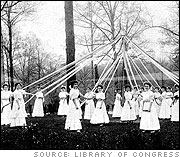What You Might Not Know About May Day

by Shmuel Ross
 Related Links |
May 1st, often called May Day, just might have more holidays than any other day of the year. It's a celebration of Spring. It's a day of political protests. It's a neopagan festival, a saint's feast day, and a day for organized labor. In many countries, it is a national holiday.
Beltane
Beltane was a Celtic calendar feast ushering in the start of summer. (It also went by a variety of other spellings and names in assorted dialects of Gaelic.)
Bonfires, often created by rubbing sticks together, were common features of Beltane celebrations. Related rituals included driving cattle between two fires, dancing around the fires, and burning witches in effigy. Another tradition was Beltane cakes, which would be broken into several pieces, one of which was blackened. They would be drawn by celebrants at random; the person getting the unlucky blackened piece would face a mock execution.
In recent years, Beltaine has been adopted or revived by neopagan groups as a major seasonal festival.
Walpurgisnacht
St. Walburga (or Walpurgis), the abbess of the monastery of Heidenheim, helped St. Boniface bring Christianity to 8th Century Germany. She died on Feb. 25, 779. As her remains have been moved on multiple occasions, several days have been designated in her honor, one of which is the first of May.
This date coincided with a pre-existing pagan festival, which, in Germany, included rites to protect one against witchcraft. This led to a hybrid legend developing, in which witches were said to meet with the Devil on the eve of May 1, on the Brocken peak. The night of April 30th became known as "Walpurgisnacht," and the annual meeting was dramatized by Goethe in Faust.
Fertility Festivals
Some cultures, such as those found in India and Egypt, had spring fertility festivals. The Roman festival celebrating Flora, goddess of fertility, flowers, and spring, was celebrated from April 28 through May 3.
Bringing in the May
In medieval England, people would celebrate the start of spring by going out to the country or woods—"going a-maying"—and gathering greenery and flowers, or "bringing in the may." This was described in "The Court of Love" (often attributed to Chaucer, but not actually written by him) in 1561:

And furth goth all the Court, both most and lest,
To feche the floures fressh, and braunche and blome;
And namly, hawthorn brought both page and grome.
With fressh garlandes, partie blewe and whyte,
And thaim rejoysen in their greet delyt.
(For modern spellings, hold your mouse pointer over unfamiliar words.)
Another English tradition is the maypole. Some towns had permanent maypoles that would stay up all year; others put up a new one each May. In any event, the pole would be hung with greenery and ribbons, brightly painted, and otherwise decorated, and served as a central point for the festivities.
May Day was also a time for morris dancing and other dances, often around the maypole. In the 19th century, people began to braid the maypole with ribbons by weaving in and out in the course of a dance. Other later traditions include making garlands for children and the crowning of the May Queen.
Labor Day
In many countries, May Day is also Labor Day. This originates with the United States labor movement in the late 19th Century. On May 1, 1886, unions across the country went on strike, demanding that the standard workday be shortened to eight hours. The organizers of these strikes included socialists, anarchists, and others in organized labor movements. Rioting in Chicago's Haymarket Square on May 4th including a bomb thrown by an anarchist led to the deaths of a dozen people (including several police officers) and the injury of over 100 more.
The protests were not immediately successful, but they proved effective down the line, as eight-hour work days eventually did become the norm. Labor leaders, socialists, and anarchists around the world took the American strikes and their fallout as a rallying point, choosing May Day as a day for demonstrations, parades, and speeches. It was a major state holiday in the Soviet Union and other communist countries.
Labor Day is still celebrated on May 1 in countries around the world, and it is still often a day for protests and rallies. In recent years, these have often been targeted against globalization.
2006: May Day Protests Return to the U.S.
In 2006, United States once again saw widespread political action on May Day this year, centering on the subject of immigration reform. Various groups and communities, under the heading of "A Day Without Immigrants," held rallies, strikes, and consumer boycotts to support the rights of those working and living in the United States, and to protest a bill that would deport many illegal immigrants.
Competing Holidays
Various authorities have tried to ban or undermine May Day, particularly the communist observances during the Cold War. In 1955, Pope Pius XII designated May 1 as a feast day of St. Joseph the Worker. In 1958, President Eisenhower designated May 1 as both Law Day and Loyalty Day. Each of these were specifically aimed at replacing the communist holiday with a religious or patriotic one.







